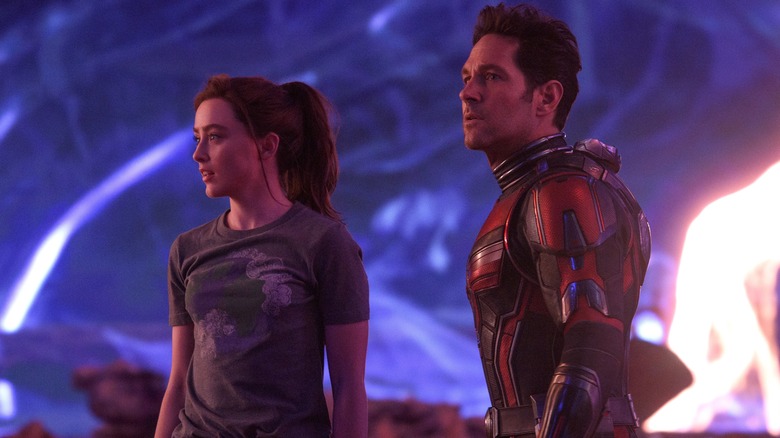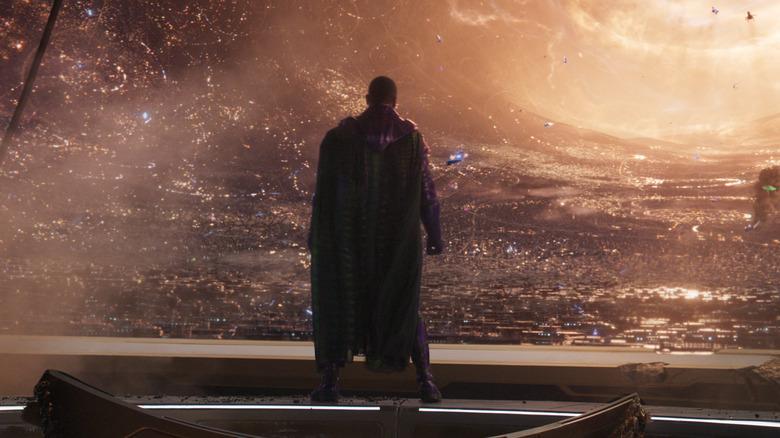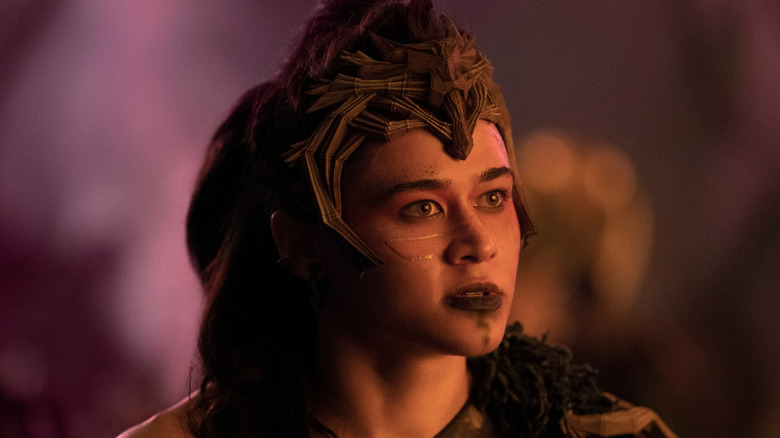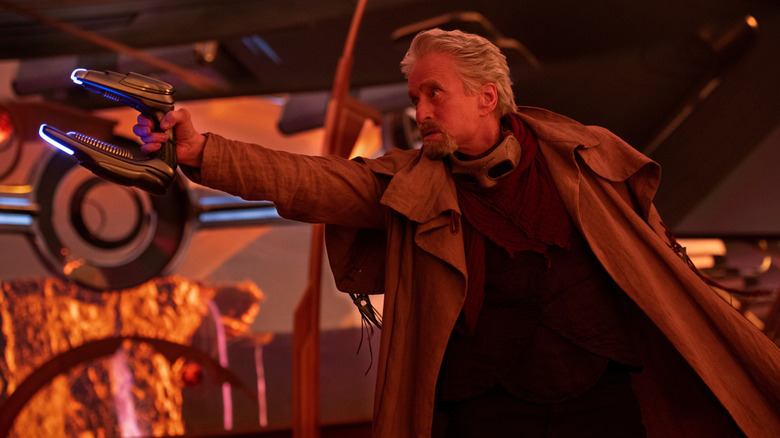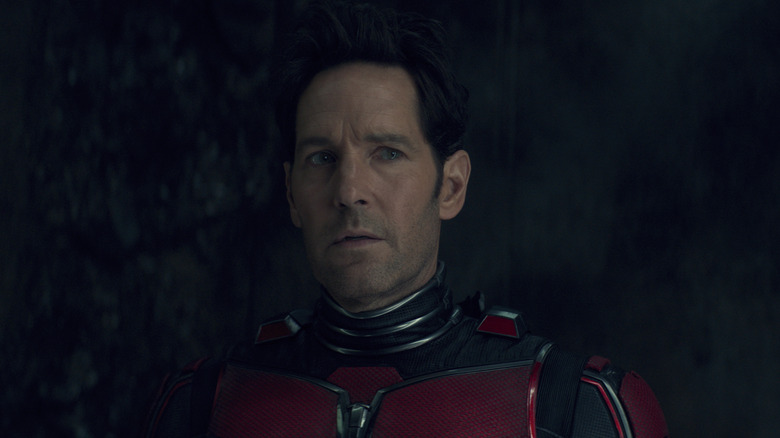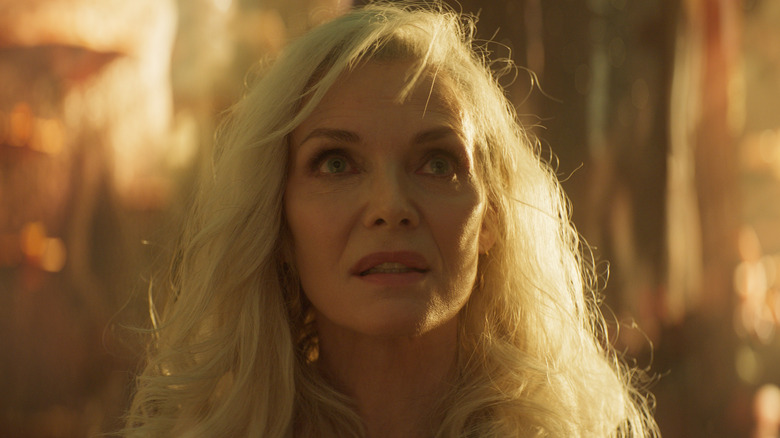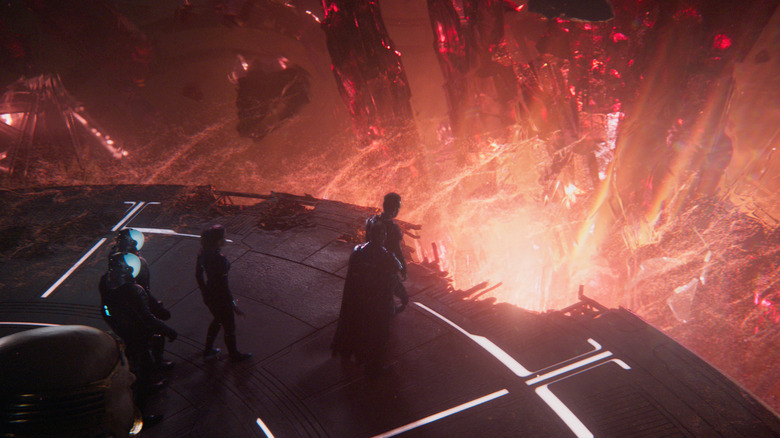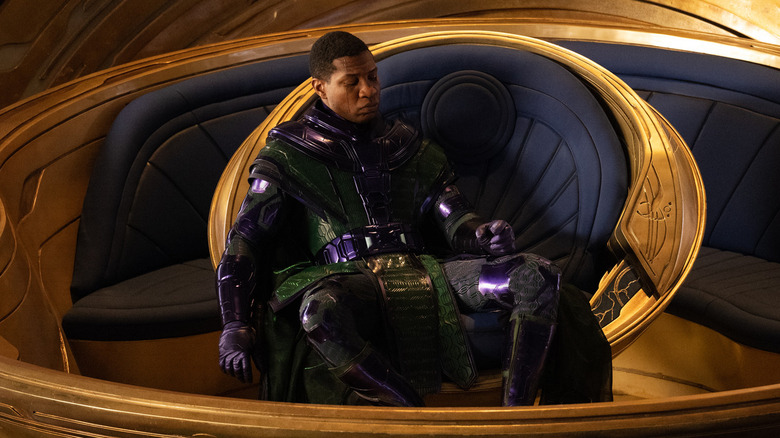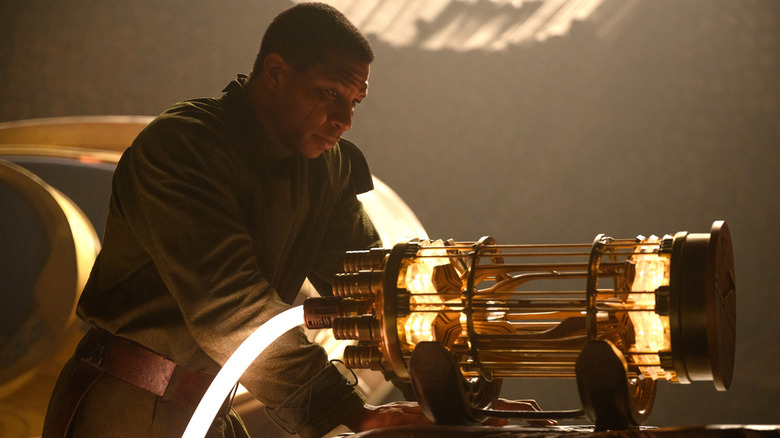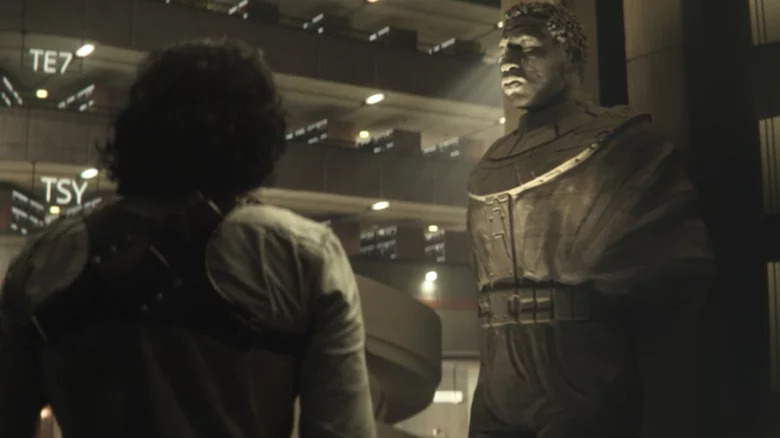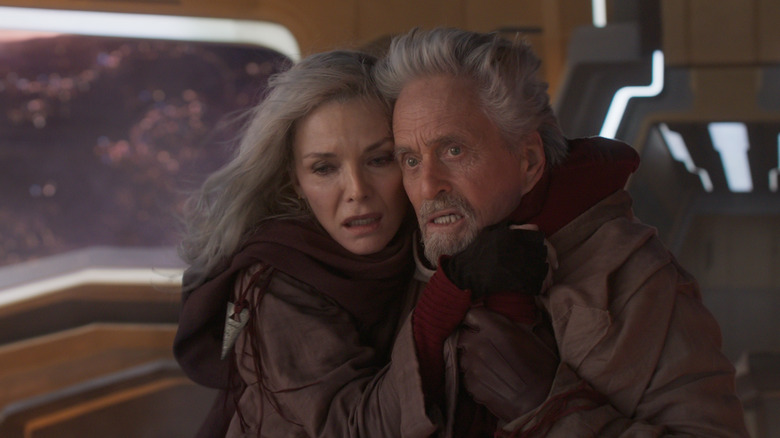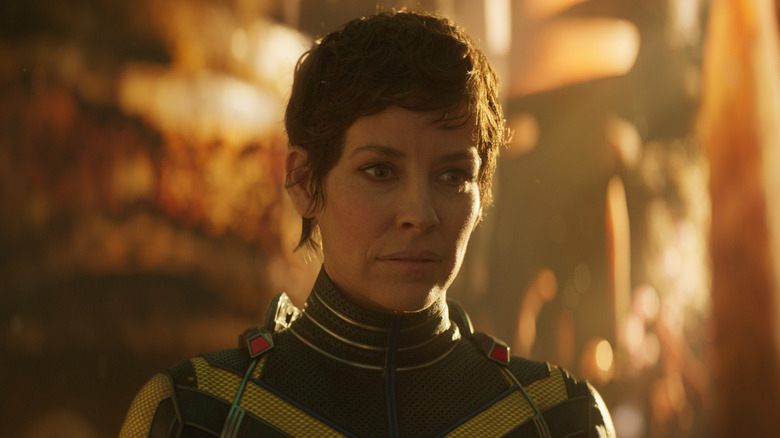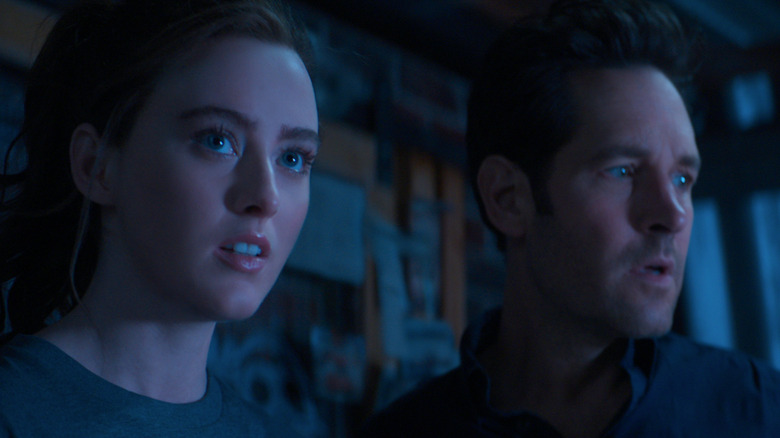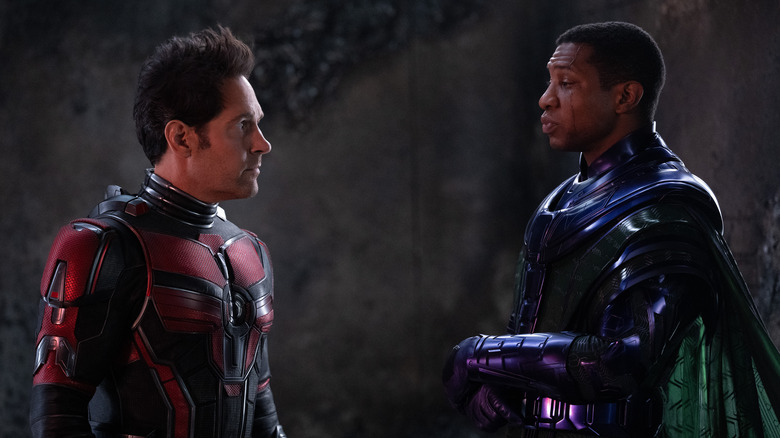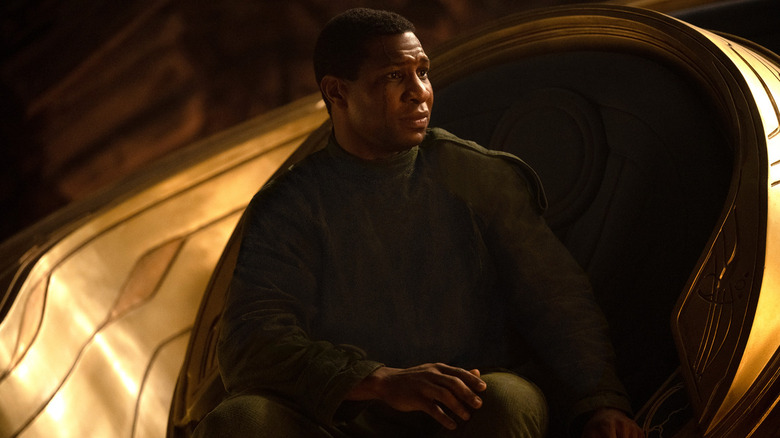The Ending Of Ant-Man And The Wasp: Quantumania Explained
After languishing in MCU side-story obscurity for his first two solo films, Scott Lang (Paul Rudd) was given the honor of kicking off Phase 5 with "Ant-Man and the Wasp: Quantumania." It's a film that dives deep into the "Quantum Realm" explored in its predecessors, while also serving as a coming-out party for the new MCU big bad: Kang the Conqueror is finally here.
Most of the movie is a sort of sci-fi mish-mash. The Quantum Realm isn't as much a strange, abstract anomaly as it is an alien planet. "Quantumania" tries to mimic the otherworldly, goofy appeal of the "Guardians of the Galaxy" films, but with a chaotic pace and offbeat tone that make it hard to fully grab onto. After being sucked back into the Quantum Realm along with his daughter Cassie (Kathryn Newton), girlfriend Hope (Evangeline Lilly), and mentors Hank Pym (Michael Douglas) and Janet van Dyne (Michelle Pfeiffer), Scott becomes embroiled in a fantastical battle for freedom. With a little accidental help from Janet, Kang (Jonathan Majors) has managed to conquer the Quantum Realm, and he's dangerously close to escaping it.
After a long, winding adventure through strange saloons and rebel encampments, Ant-Man faces Kang in an all-out battle. Amidst all the CGI mush and cringey one-liners, you might have missed the major implications of the climax, but fear not. Below is the (spoiler-heavy) ending of "Ant-Man and the Wasp: Quantumania," explained.
Kang's master plan
For the first half of "Quantumania," Kang's name isn't spoken. Characters refer to him as "the conqueror," or simply, "him." Janet offers frustratingly little explanation for the villain until the middle of the story because, well, the plot demands some intrigue; finally, some backstory is spilled about an hour into the film.
During Janet's many years spent stranded in the Quantum Realm, she came across a marooned Kang. He claimed he was a scientist and that his ship had malfunctioned. Janet helped him repair it, only to discover his true identity — a malevolent tyrant, exiled by his brethren to the one place he couldn't escape through time-travel. She (sort of) destroyed his multiversal engine and fled, spending the ensuing years fighting him alongside other denizens of the Quantum Realm.
Since then, Kang has been making moves to escape his prison, return and take vengeance on his variants. However, in the film's final act, it is revealed that he's not planning to go alone. After recapturing Janet, Kang explains that he's planning to take the whole empire he built in the Quantum Realm with him — a massive, futuristic sprawl that evokes his comic book headquarters Chronopolis. Whether he intends to take the citadel directly to his variants' hiding place or somewhere else to continue building strength is unclear. Unfortunately for him, the time needed to transport such a massive fortress gives Scott and his allies time to strike.
Rebellion
Janet explains that Kang has wiped out entire timelines in his quest for power, killing countless innocents in the process. "Quantumania" gives viewers a more tangible look at what life under his rule is like, via the residents of the Quantum Realm.
When the crew is pulled in at the start of the film, they're separated, with Scott and Cassie landing in one place and Hope, Hank, and Janet in another. Scott and Cassie are quickly found by a group of freedom fighters led by the fierce Jentorra (Katy O'Brian), who explains that their home was decimated by Kang's army. It makes sense, then, that when Cassie rescues Jentorra in the film's final act, they're quickly able to draw legions of rebels to their aid.
All it takes is a corny speech from Cassie, projected throughout the Quantum Realm, and the knowledge that Kang's fortress is indeed penetrable. From there, the warriors just keep coming.
Kang has a few villainous lines flexing over how many rebellions he's put down, and how many Avengers he's killed in alternate timelines, but he ultimately fails to squash this one. The whole final battle is a massive, computer-animated reminder of one of the film's core messages — that fighting for what's right, even against impossible odds, is worth it. Cassie emphasizes this point throughout the film, so it fits that she's the one to rally the rebels in its final act.
Ants to the rescue
The combined might of the Quantum Realm rebels deals a heavy blow to Kang, but it's not enough to finish him. Late in the battle, the conqueror enters the fray himself and begins wiping people out of existence with an impressive display of power. For a moment, it looks like he might be able to ward off the attackers singlehandedly. But then Hank shows up with an army of ants.
While these futuristic super-ants are later explained, they're still one of the more confusing parts of the movie. They are initially glimpsed during the scene in which Cassie demonstrates her Quantum Realm "satellite." For a moment, it looks like the two science fair projects might be connected, but that doesn't seem to be the case. Techno-ants are just the latest iteration of Hank's obsession with the little critters — one that has apparently resulted in them being ... smarter? Good at computers? It's all a bit rushed.
These ants are then pulled into the Quantum Realm alongside the others and encounter a "temporal anomaly." This causes them to enter a separate timeline (or location? It's not entirely clear), where they live and build a new society for a thousand years. Eventually, they're able to work their way back to Hank and help him in his hour of need.
Needless to say, there are a lot of questions here. Doesn't the Quantum Realm exist "outside of time?" Why didn't the human characters hit any temporal anomalies? Unfortunately — or perhaps, for the better — the whole thing is played for somewhat lackluster comedic effect and dodges any canonical culpability.
The death of M.O.D.O.K.
"Ant-Man and the Wasp: Quantumania" is filled with weird and kooky moments. It's a movie that asks big questions, like how many holes you have. There's a character who looks like broccoli because, as any seasoned comic will tell you, that's just classic joke writing. But perhaps the film's most baffling facet is its handling of fan-favorite comic book baddie M.O.D.O.K. — the mechanized organism designed only for killing.
In a bizarre twist, "Quantumania" makes Darren Cross (Corey Stoll), the villain from the original "Ant-Man," into M.O.D.O.K. To be fair, it's hard to do M.O.D.O.K. in any way that isn't totally ridiculous, but this still feels like a bridge too far. Through the final act, Darren has a character turn so sudden that it can hardly be called an arc, leading to him making a noble sacrifice. His death is played for laughs, with him demanding the title of "Avenger" right before his death knell.
It's strange, and not particularly funny. This could be read as way to wrap up loose ends from the start of the "Ant-Man" trilogy, but "Quantumania" so rarely feels like a climax to Scott Lang's story that Darren's return is just off-putting. More than anything, his inclusion feels like a way to sneak in a named character death without having to kill the mood by burying one of the actual protagonists.
Going home
Thanks to Hank's sci-fi ant army, Kang is defeated, and Janet manages to create a portal back to Earth ... somehow. Presumably, she reverses the signal that first pulled them in during act one, using Kang's rebuilt multiverse engine to create a portal they can actually walk through. But it all happens so fast and the technology is so poorly explained that it's hard to say for sure. Regardless, everyone except for Scott steps through before Kang returns, sparking another last-ditch duel between him and Ant-Man.
Hope jumps back through to help Scott, and after slapping a smattering of Pym Particle disks on Kang's engine core, they appear to finish the villain off for good. It's not entirely clear what actually happens to the drive, however, or to Kang, who appears to be sucked into it as it overloads. The result is that the portal closes, and Scott and Hope look out over the liberated Quantum Realm that could now be their permanent home.
They're not stranded for long, however; Cassie does some quick keyboard-smashing and reactivates her own device, opening the portal back up and reuniting the whole family. This is, again, not really explained. The multiverse core seems to have been destroyed, so how is Cassie able to reopen the portal? If that was possible without using the core, couldn't Kang have simply built a similar device to hers and extracted himself from the Quantum Realm long ago? Stare too hard at the subatomic tech in "Quantumania" and it starts to fall apart a bit. The important thing is that Kang is defeated (killed?), and the entire family gets home safe.
The fate of the Quantum Realm
Thanks to Scott and the gang, the Quantum Realm is finally freed from Kang's tyrannical grip — at least, for the moment. The ambiguity of the conqueror's fate leaves things a bit up in the air, but even if he managed to survive, he'd likely have little interest in returning to the site of such an embarrassing defeat.
That begs the question, what's next for the realm? Jentorra tells Cassie there was a whole society in her land that Kang destroyed. Presumably, it looked a lot like the places farther from Kang's reach that are seen — "Star Wars" cantinas, bustling open markets, and weird, living buildings erected in more rural areas. Perhaps now that Kang is gone, that lifestyle will return. Jentorra herself would make a great leader.
Of course, this only accounts for one small corner of the Quantum Realm. The whole story of "Quantumania" seems to take place in a relatively small area — the equivalent of a small country, which Kang has conquered. Janet describes the realm as being much bigger than that, saying it has worlds within worlds. This is teased again with the time-traveling ants plotline. Could these other levels be explored in future films? Could the freedom fighters become allies to the Avengers in future MCU stories? Only time will tell.
The Council of Kangs
The first of two post-credits scenes in "Ant-Man and the Wasp: Quantumania" shows a meeting of the other Kang variants, who banished the film's main villain to the Quantum Realm. In a colosseum positioned as what could be the MCU's actual Chronopolis, we see a huge number of Kangs — apparently "all" of them — assembling and cheering like crazed fanatics preparing for war. However, the main action of the scene takes place with just three variants.
Though viewers don't get names in the scene, at least two of these Kangs should be recognizable to fans of the comics. The one driving the conversation — and who apparently called the gathering in the first place — wears regal robes and a tall hat that immediately evoke Immortus, arguably the most powerful version of Kang. He's joined by another variant clad in the garb of an Egyptian Pharaoh, evoking Kang's very first comic incarnation: Rama-Tut. The third variant of this core trio is much more sci-fi in style, almost appearing cybernetic. It's possible that his design is connected to Kang's Kid Immortus incarnation from the comics, but that would bring up some other big questions.
All three of these comic-book Kangs have diverse, specific roles in the Marvel story, so it should be interesting to see how they mesh in the MCU. Their mission, however, is clear. The Avengers of the primary timeline have become too powerful, and the Kang Dynasty wants to wipe them out.
Is Kang the Exile truly dead?
In the mid-credits scene featuring the Council of Kangs, it's said that the variant Ant-Man just battled in the Quantum Realm is dead. The Kang who resembles Immortus claims this is true and rejects the others' doubts. You'd think an assembled legion of such powerful beings would know definitively one way or the other, but it's hard to say for sure if the exiled Kang is actually gone for good.
It isn't really made clear what happened to him. When Scott douses the multiverse drive in Pym Particles, it appears to overload, and then Kang simply vanishes into it. It's possible that the energy emitted by the device vaporizes him on the spot, or that he's pulled apart into a million different universes, torn asunder for all time. However, it's also possible that he's simply teleported somewhere else — somewhere he can lie in wait for the perfect moment to strike.
It's difficult to predict whether or not the exiled Kang will return, because there's so much still unknown about Phase 5. "Quantumania" positions him as a particularly dangerous Kang variant with a unique motivation, but the franchise could just as easily replace him with the Council of Kangs. A story about the exiled variant coming back for his revenge might be interesting, presenting a more singular force with which for viewers can invest themselves. Alternatively, it might be way too complicated.
Loki and Mobius return
The second post-credits scene in "Ant-Man and the Wasp: Quantumania" sets up "Loki" Season 2, bringing back the Asgardian master of mischief (Tom Hiddleston) and his Time Variance Authority friend Mobius (Owen Wilson). The scene opens with a Kang variant giving an old-timey expo presentation on his wacky time technology. It is then revealed that Loki and Mobius are in the audience, and they've traveled here specifically to find him.
It is unknown when exactly this moment occurs, in what timeline, or with what version of Kang. However, it does reveal a few things.
At the end of "Loki" Season 1, Mobius loses all memory of Loki after Sylvie (Sophia Di Martino) unleashes the multiverse and rewrites the timestream. When Loki returns to the TVA afterwards, it has a giant statue of Kang in the middle of it. The fact that Mobius has accompanied him on his mission to find Kang shows that Loki has reestablished some semblance of his former trust and friendship with Mobius. However, the scene presents as many questions as answers.
Mobius seems to not know Kang here, with Loki reassuring him just how dangerous the villain is. But if there's a giant Kang statue in the TVA, wouldn't Mobius have some idea of the conqueror's nature? "Loki" Season 2 will surely shed more light on this.
Family first
At its core, "Quantumania" attempts to be a movie about family — about the harm that comes from keeping secrets from those around you, and about how a family can get through anything if they stick together. How effective it is in executing that theme is up for debate.
The main relationship dynamic in the story is the father-daughter bond between Cassie and Scott, which is cute and effective at times. The problem is that it's also all over the place. The script often seems confused as to what their relationship actually is. They fight, but they also joke around so much that nothing ever seems at stake. The tension the film tries to create between them generally feels hollow, and while their support of one another is heartwarming, it goes largely unanalyzed.
The same can be said of Janet's role in the story. She clearly carries a lot of guilt over her role in empowering Kang, and she's ashamed to tell the entire story to her family. But again, this tension doesn't really go anywhere. Hope and Hank only ever support her — which, again, is nice to see, but also leaves viewers largely without an emotional anchor for Janet's arc.
By the end, the film conveys a pretty benign but positive message about supporting your family and making space for their mistakes. It just would have been nicer if that message packed a bit more punch.
The duty of an Avenger
Another major theme of "Quantumania" is what it means to be a hero. At the start of the film, Scott has to get Cassie out of jail after she's arrested while protesting police brutality toward the unhoused. They have a proper confrontation about what it means to help people, and she clearly thinks he's failed to live up to his title as an Avenger since "Endgame."
This point comes up again after they're pulled into the Quantum Realm. Scott just wants to get Cassie to safety as quickly as possible, but she wants to stay and help Jentorra and the other freedom fighters. "Just because it's not happening to you doesn't mean it's not happening," she tells him at one point. But M.O.D.O.K. attacks before they can properly dig into that idea.
In the end, Scott seems to reclaim his title as an Avenger. He uses his powers for good, helping the people of the Quantum Realm depose their despotic ruler, and he even gets to do it on bring-you-daughter-to-work day. The moment of giant Scott and giant Cassie hugging is undeniably cute, even if their dynamic through the film is a little inconsistent. She's now become a hero herself, foreshadowing her possible future in the franchise.
What's next for Cassie Lang?
Rumors have circulated for years that a "Young Avengers" project could be coming down the line in the MCU. With characters like Kate Bishop (Hailee Steinfeld), Joaquín Torres (Danny Ramirez), and America Chavez (Xochitl Gomez) all entering the story in Phase 4, there are certainly enough heroes to fill out such a roster. Speaking with Inverse prior to the release of "Ant-Man and the Wasp: Quantumania," producer Stephen Broussard claimed that no such film is currently in the works, but did acknowledge that passing the torch was a major theme of Phase 4.
Cassie Lang would fit perfectly into a "Young Avengers" story. She and Kate are close friends in the comics and join the team together. They've also become a popular ship in the Marvel fandom, presenting a great opportunity for Disney to finally put its money where its mouth is in terms of queer representation. Kathryn Newton is great as Cassie in "Quantumania," and it would be fun to see her become even more important as the franchise moves forward.
Will Ant-Man return?
Cassie Lang seems like a shoe-in for future MCU projects; her dad, however, is harder to predict. Paul Rudd has been playing Ant-Man for close to a decade now, and many of his peers have been phased out of the MCU. "I have no idea what my future in the MCU or in Marvel is at all," the actor told Insider prior to the "Quantumania" premiere. "None of this is my call, so I try not to think about it too much. So you'd have to ask the Marvel brass that one."
In the comics, Scott Lang meets somewhat of a gruesome end, which prompts Cassie to follow in his footsteps as an Avenger. While he seems headed for a happier wrap-up in the MCU, "Quantumania" certainly doesn't rule out a return to action for the character. If the exiled Kang variant ends up being right, and Scott's actions in the Quantum Realm do endanger the Earth (which feels inevitable), he might feel an obligation to suit-up once again. He'd also most certainly have something to say if his daughter begins fighting crime on the regular.
The Kang Dynasty approaches
Though much is still unknown, "Quantumania" does its job in planting the seeds of the Kang threat for Phase 5 and beyond. With the council now tipped off to the heroes' growing fame and power, it's inevitable that they'll all cross paths soon. "Loki" Season 2 looks like the next logical place for the Kang storyline to continue, but fans can also look forward to at least one more big-screen feature for the villain down the line.
The next proper "Avengers" movie, and the first since "Endgame" in 2019, is entitled "Avengers: The Kang Dynasty." The film is set to be released on May 2, 2025, preceding "Avengers: Secret Wars" by just a year. The last time two "Avengers" movies came out that close together, things turned out pretty well. And as the first of the two, "The Kang Dynasty" could venture into more emotional and mature narrative territory, similar to how "Infinity War" did. Given how spectacular Jonathan Majors is in "Quantumania," that's an exciting prospect. It will also be interesting to see how closely the film adheres to the comic book storyline of the same title.
Before then, Kang has a good chance of appearing in the MCU's long-awaited "Fantastic Four" movie. He's a frequent enemy to the team in the comics and has some interesting connections to Reed Richards in particular, so it would make sense for him to play a substantial role. The Kang Dynasty is coming, and hopefully, it'll be a blast to watch.
